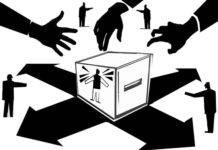Bangladesh journalist Shahriar Kabir has urged the government to ban the country’s biggest Islamist party, the Jamaat-e-Islami, and blamed the organisation for the wartime atrocities committed during the 1971 Liberation War.
Kabir, who is the Executive President of Forum for Secular Bangladesh and Trial of War Criminal, said: “We are asking government, you have to ban Jamaat-e-Islami for committing genocide, war crimes and crimes against humanity in 1971. You have to ban Jamaat-e-Islami for their involvement with Islamic militancy as well as for killing the religious and ethnic minorities.”
Wrangling over a war that ended 42 years ago might puzzle outsiders, but it underlines the unresolved rift within this South Asian country of 160 million between secular nationalism and a belief that Islam is the defining core of the state.
Kabir also said that Jamaat-e-Islami as an organisation should be tried in the International Crimes Tribunal.
“You can apply Special Powers Act, you can apply Anti-Terrorist Act or you can implement, follow Article 38 of our Constitution. So, there are many laws as well as we have a tribunal for the trial of the war crimes. International Crimes Tribunal is going on and we have already asked to try Jamaat-e-Islami as an organisation for committing genocide and crimes against humanity during the liberation war,” he added.
The tribunal’s failure to sentence Abdul Quader Mollah to death sparked public outrage that was fuelled by secular activists who used blogs and social media websites to call for mass protests.
Tens of thousands poured into the Shahbag area of central Dhaka, staging rallies and vigils. The rise of their movement was soon referred to as a “Tahrir Square” moment, after the scene of protests in Cairo that led to the overthrow of Egyptian strongman Hosni Mubarak in 2011.
Blood-letting erupted across the country at the end of February when the war crimes tribunal condemned a top leader of the Jamaat party to hang.
The army was deployed after furious Jamaat activists attacked police with crude bombs, swords and sticks, burnt down houses of Awami League leaders and Hindus, and raided Hindu temples.
At least 30 people were killed on the day of the ruling alone, and the toll ratcheted up over the next few days.
Kabir said that political parties and civil society should build up resistance against atrocities committed by the Jamaat-e-Islami.
“The political parties, the progressive political parties were campaigning for secular democracy as well as the civil society who were campaigning for secular democracy, they should also build up resistance against atrocities of Jamaat-e-Islami in the name of Islam and that is very very important,” Kabir also said.
For now, the feud between bloggers and Islam has diverted attention from a stand-off between Prime Minister Hasina and BNP leader Begum Khaleda Zia over whether to install a caretaker authority to ensure a free and fair election.
Both heirs to political dynasties, Hasina and Khaleda have rotated as prime minister since 1991 amid unending enmity.
Diplomats in Dhaka say the interim administration row will come to a head around September.
If that impasse is not broken, the BNP may boycott the poll, unleashing fresh unrest – or there could be a repeat of 2007, when the army stepped in and installed a provisional government to crack down on the political thuggery and violence.
Source: newstrackindia









